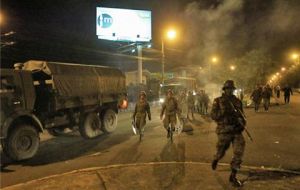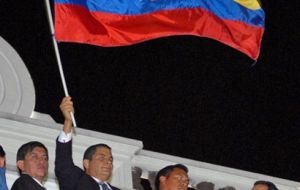MercoPress. South Atlantic News Agency
Ecuador president, hostage of mutinous police freed by elite Army forces
 Exchange of fire broke out when the Army moved into the hospital
Exchange of fire broke out when the Army moved into the hospital Ecuador’s elite forces freed President Rafael Correa late Thursday in a raid on a hospital where police held him captive as part of wage dispute that regional leaders labeled an organized coup attempt.
“I’m not going to negotiate absolutely anything,” Correa said from the presidential palace after being freed amid gunfire, according to remarks broadcast on the Telesur network. “I told them I was leaving here as president or a cadaver.”
Two policemen have died in the clashes, according to the official broadcast. Correa said police had “stabbed me in the back” and called their behavior an act of treason.
The military raid came after Ecuador declared a state of emergency when hundreds of police protesting wage cuts blocked roads, shut the airport for several hours and sprayed teargas on Correa.
Several regional leaders backed Correa’s claim that he was the target of an organized coup, and with the exception of the Brazilian and Colombian presidents, they all headed to Buenos Aires for a meeting to show support.
President Correa was taken to a hospital after scuffling with the police and was trapped there as officers surrounded the facility, refusing to let his personal security forces escort him out of the building. Looters ransacked banks, supermarkets and shopping malls in the port city of Guayaquil the country’s largest. The Red Cross said 51 people were injured in the violence.
Police and soldiers began rebelling after congress last night passed measures that would delay automatic promotions and slow salary increases. Correa defended his policies, which he says are part of a drive to eliminate government waste.
Correa’s claims his presidency is at risk may be an attempt to drum up support among his allies, said Andres Ochoa, a researcher at the Washington-based Council on Hemispheric Affairs.
Correa had a 67% approval rating in Quito and 59% approval in Guayaquil, according to Habitus poll of 800 adults published Sept. 15. The survey had a margin of error of 4 percentage points.
The opposition in recent weeks has stepped up its attacks as economic growth trails its neighbors and Correa’s threats to expropriate assets in the oil industry, the country´s biggest, deter private investment. Correa also angered opponents by pushing through an oil law by decree and ignoring lawmakers’ objections to his plan to broaden the state’s control over universities and local budgets.
Gen. Luis Ernesto Gonzalez, commander of the armed forces, reaffirmed troops’ loyalty to Correa even while calling on the president to reconsider the pay and benefit cuts for the protesting cops.
“We emphatically request that the law be revised or left without effect so that the rights of public service workers, military and police aren’t affected and so that the Ecuadorean state can return to normality,” Gonzalez said in comments broadcast on state television.
About 300 members of the armed forces stormed Quito´s airport, blocking the airstrip and closing the facility for nine hours.
PetroEcuador, the South American country’s state-owned oil company and biggest source of export revenue, said operations were normal as the military guarded refineries and oil fields.





Top Comments
Disclaimer & comment rules-

-

-

Read all commentsIf it was an attempt of coup d' etát, I'm glad it didn't work. Unasul is working right now to insure democracy in Ecuador. Best wishes for Ecuadoreans.
Oct 01st, 2010 - 10:48 am 0If the Unasur are so worried about democracy in the region they should start by demanding Chavez to step down and clear the way for freedom and political diversity and allow venezuelan democracy to take the natural course with different presidents and political parties.
Oct 01st, 2010 - 11:42 am 0@Monterrey
Oct 01st, 2010 - 12:02 pm 0That was ridiculous. To force an elected leader to step down from power even if the population itself has elected him and his party - in usual elections and referenda - into the presidency and the Congress like the last elections has shown? What for? Not only is Chavez in power due to the will of the Venezuela people, but forcing him to step down would be to put a foreign entity will above that of the people. Forcing Chavez to do that would be antidemocratic.
Commenting for this story is now closed.
If you have a Facebook account, become a fan and comment on our Facebook Page!